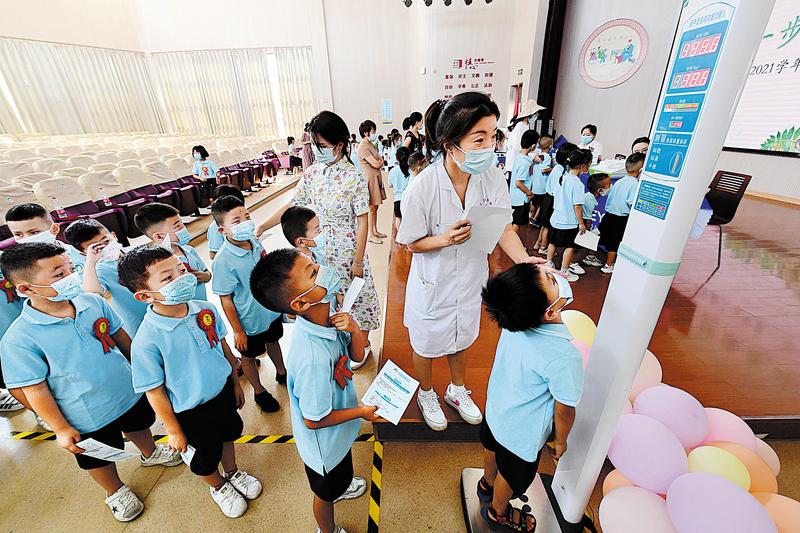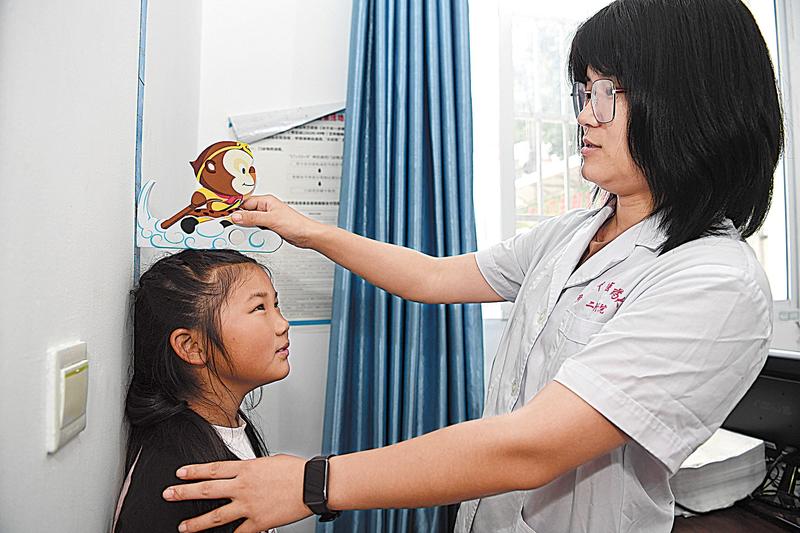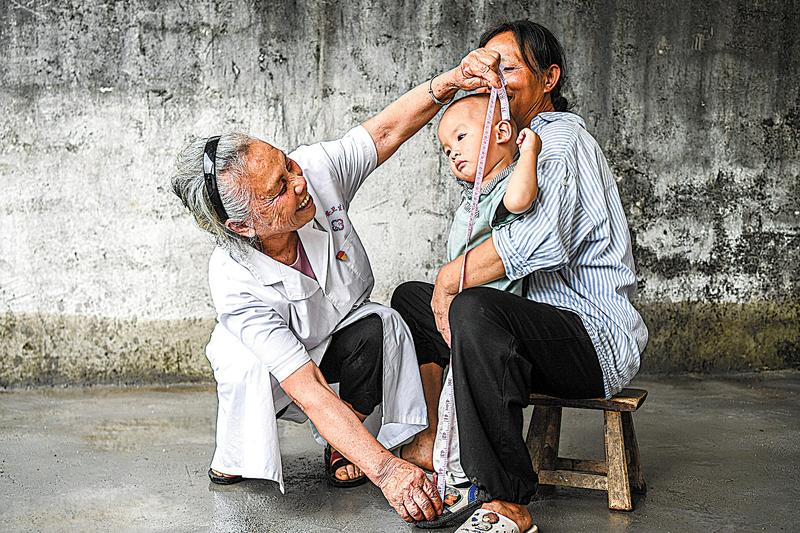Medical advice sought as children's height causes concern
 Students' height is measured on their first day at a primary school in Jinhua, Zhejiang province, in late August. (SHI BUFA / FOR CHINA DAILY)
Students' height is measured on their first day at a primary school in Jinhua, Zhejiang province, in late August. (SHI BUFA / FOR CHINA DAILY)
Luo Yan and her husband are above average height, but their two daughters, ages 9 and 10, are no taller than many of their classmates.
Early last month, Luo took the girls to a Shanghai hospital to inquire if they needed to use a growth hormone.
Li Pin, a pediatric endocrinologist, checked the bone ages and sex hormone levels of the girls, who are 135 centimeters and 149 cm tall, respectively, and told their mother that their genetic heights are both 167 cm and there is no need for them to have a growth hormone injection.
The number of cases related to children’s growth and development account for roughly 20 percent of the total number of child diseases at large medical institutions in China.
Wang Xiumin, pediatrician spe-cializing in endocrinology at United Family Healthcare in Shanghai
Bone age is a measure of the degree of skeletal maturity of a child, while genetics play a key role in determining height, which as a general rule is based on how tall a person's parents are.
Li finally managed to persuade Luo to abandon the idea of growth hormone injections after telling her both girls are growing normally and healthily. They do not have any signs of sexual precocity-the onset of secondary sex characteristics at an earlier age than expected, typically before age 6 to 8 in girls, or 9 in boys.
Pediatric endocrinologists, including Li, said they are frequently consulted by parents such as Luo, whose children are not short compared with their peers and who are not expected to be short as adults. The parents simply want them to grow taller.
Li, director of the endocrinology department at the Children's Hospital of Shanghai, said, "If we ask the parents how tall they want their sons to be, most of them say 175 cm is the bottom line, but some say it's 180 cm.
"Children's height has become an issue that has triggered parental concern, in addition to the academic performances of offspring. Everybody wants a perfect child and nobody wants their child's height to be below average," she said.
Doctors said the National Health Commission's Women's and Children's Department calculates the average height of children at different ages every decade. Those whose heights fall below a 3 percent average on the national health chart are considered short.
Li said, "Chinese are growing taller in general, but there are always people below the 3 percent line. Medically speaking, males taller than 1.60 meters and females reaching 1.50 meters are deemed healthy, but some parents are not satisfied with this."
A paper published in The Lancet medical journal last year about height and obesity trends in teenagers said Chinese were the tallest such group in East Asia, surpassing their counterparts in Japan and South Korea.
Over the past 35 years in China, the average height of 19-year-old males has risen by 8 cm to 175.7 cm, while the average height of females of the same age had risen by 6 cm to 163.5 cm.
However, a survey released by Health Times and Beijing Children's Hospital in December found that nearly 66 percent of parents said they thought their children were short.
 Zhang Qingyu, 9, is measured by her mother at a village clinic the girl's parents helped set up two years ago in Huangjian township, Xiuning county, Anhui province. (LIU JUNXI / XINHUA)
Zhang Qingyu, 9, is measured by her mother at a village clinic the girl's parents helped set up two years ago in Huangjian township, Xiuning county, Anhui province. (LIU JUNXI / XINHUA)
Job opportunities
Although in medical terms those below the 3 percent average are considered short, doctors said many children that are taken to hospitals fall below the 20 percent average in the national health chart, adding that numerous teenagers are fixated with their stature.
According to local media reports, at the start of the new semester in September, Xishan Senior Middle School in Wuxi city, Jiangsu province, asked a new intake of students to complete forms requiring their basic information.
According to the details provided, the average height of boys was 180.9 cm, while for girls, it was 166 cm. But these figures were later found to be 7.6 cm and 4.1 cm taller respectively than the actual heights, meaning the students had exaggerated their stature when completing the forms.
Children who have reached puberty, and their parents, believe that stature, an important part of appearance, is a factor in social interaction.
Luo, the mother from Shanghai, said: "Height will largely affect my daughters' job opportunities in the future. Some university departments, including ocean navigation and hotel management, have height requirements for applicants."
She said she had seen reports in China and overseas stating that a person's stature has a direct bearing on their income.
In 2014, a survey in Sweden found that when a man gains 10 cm in height, his income rises by 6 percent.
Han Jun, the father of a 6-year-old boy from Changzhou city, Jiangsu province, who sought medical advice on the height of his son, said difficulty in finding a partner in the future would be a key concern for the boy if he was not tall enough.
"Most women prefer tall, handsome men. For our generation, it's hard for men shorter than 170 cm to find a girlfriend, and for the next generation, the bar will be set even higher," Han said.
 A village doctor measures a boy in Zhongshan county, Hezhou, Guangxi Zhuang autonomous region. (CAO YIMING / XINHUA)
A village doctor measures a boy in Zhongshan county, Hezhou, Guangxi Zhuang autonomous region. (CAO YIMING / XINHUA)
Growth hormones
Statistics show the use of growth hormones in China had risen significantly each year since 2012.
According to Guanyan Tianxia, a consulting company based in Beijing, the market scale of growth hormone products in China was 800 million yuan in 2012, with the annual cost per user averaging 35,400 yuan. These figures rose respectively to 5.9 billion yuan and 42,700 yuan in 2019. Estimates showed the market size would reach 9.5 billion yuan last year and exceed 11 billion this year.
Doctors said the increased use of growth hormones is the result of rising awareness of such products over the past five years, but there is still various misconceptions about them.
Experts said the unnecessary use of these hormones is cause for concern.
Li said: "When we receive a case involving a child, we first need to diagnose if his or her short stature is the result of a lack of growth hormones in the body, because these act basically as a medicine for patients. People with sufficient growth hormones do not need to use them at all."
Experts said the increased popularity of growth hormones is also associated with the increasing use of another type of injection to delay children's sexual development if sexual precocity is experienced at an inappropriately early age.
Li said doctors agree that 10 or older is the right age for a girl to experience her first menstruation, but the incidence of sexual precocity has become increasingly common.
Research carried out by Li's team found that such incidence is now between 5 and 30 per 1,000 in China, about 10 times the figure in the late 1980s and early 1990s. The social environment, industrial development and dietary factors are accountable for this trend.
Li said that for these children, doctors prescribe an injection to delay their sexual development, but the inoculation might affect the rate at which they grow. As a result, hormone injections are frequently used in such cases.
Over the past two years, Zhang Yinuo, 10, who comes from a county in Daqing city, Heilongjiang province, has received two injections to delay sexual development. During the pandemic, her parents have taken her to a Shanghai hospital for medical consultations every three months, despite the difficulties in traveling.
Although the hospital visits have cost the family more than 60,000 yuan ($9,438), her parents felt it was money well spent, as Zhang's genetic height was estimated at 152 cm, but in the past two years, she has grown an additional 6 cm.
The girl's father, Zhang Ran, an administrative worker at a local health bureau, said: "My wife and I are below average height. We started worrying about Zhang's height when she was 3. We're now happy with the medical results and we are no longer worried about her."
Doctors stressed that it is important for children receiving such injections to return for checkups every three months to assess whether the dosage level needs to be adjusted. The checkups also monitor any side effects, including benign intracranial hypertension (increased pressure in the brain in the absence of a tumor), thyroid hormone deficiency, high blood glucose levels, and spinal curvature.
Li said the use of growth hormones is being abused in some areas, but professional medical teams in large cities have strict regulations for prescribing them.
She said that in some places, institutions estimate a child's future height by using software. When a disappointing result indicated, parents often ask doctors to prescribe growth hormones for their children, but this is counter to professional practice.
"For children where medical advice is sought, these young people are basically sick and their growth does not follow the natural rules. Instead, we must consider various other important factors, such as bone age and the stage reached in sexual development. This requires assessments by doctors," Li said.
"More important, growth hormone injections don't help children whose growth is affected by other factors."
Medical change
Experts said they believed the increased parental concern over children's height also stems from evolving child diseases in recent decades.
Wang Xiumin, a pediatrician specializing in endocrinology at United Family Healthcare in Shanghai, said respiratory and digestive diseases as well as injuries (resulting from insufficient care in families with several children) used to account for more than 90 percent of child diseases clinically, but this has changed in the 21st century.
The social environment has changed greatly, along with children's diets and lifestyles, and these factors have led to cases of sexual precocity rising significantly.
"The number of cases related to children's growth and development account for roughly 20 percent of the total number of child diseases at large medical institutions in China," Wang said.
"Now, the parents of some 30,000 children are seeking medical advice and treatment each year at grade A tertiary hospitals in Shanghai for their off-springs' growth and development. This is a rise of 260 percent compared with five years ago, and 500 percent compared with 10 years ago," she said.
In 2017, statistics from Peking University's School of Public Health showed that the incidence of child obesity had doubled in a decade, and the prevalence of sexual precocity rose threefold over the past 10 years.
"In the past, people used to hope to remain disease-free, but now, with the general rise in living conditions, they want far more than just to be healthy," Wang said.
She added that the increased parental focus on children's height is also the result of more attention being paid to minors' health and growth, which in turn will produce a healthier adult population.
"Advances in medical development and the increased awareness of diseases among the public will certainly result in hospitals seeing more patients in areas where there is disease," she said.
Li said: "We hope those unsatisfied with their height come to hospitals earlier. Typical examples at my clinic involve 13- or 14-year-old boys in middle adolescence, but in such cases there is limited scope for doctors to change the situation."


